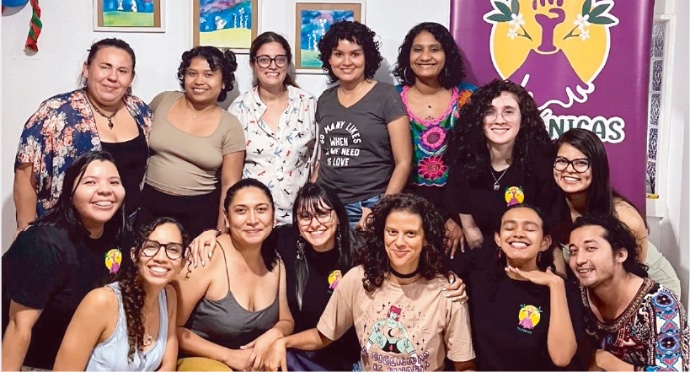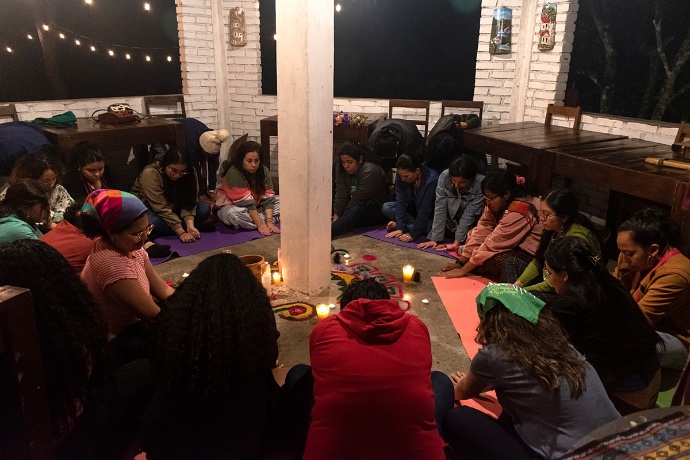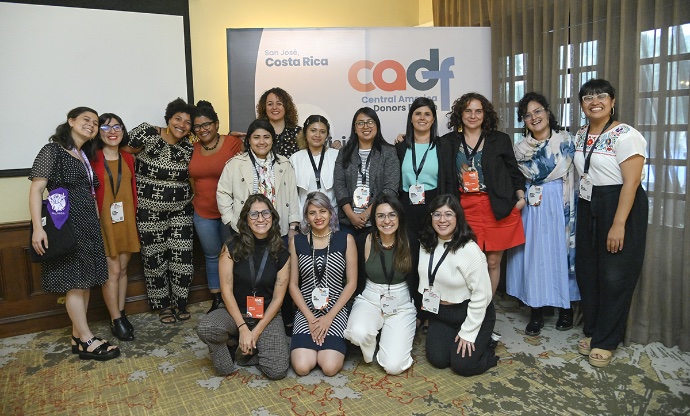By Amber Cortes

Anniversaries are a perfect time to reflect upon where you’ve been, and where you’re going.
After mobilizing more than $6 million in funding to support over 100 youth-led organizations across Central America and Mexico, the Central America Youth Fund (CAMY Fund), a program of the Seattle International Foundation (SIF), is celebrating their tenth anniversary—and looking ahead to what’s next.
“Though the coming fund for the next five years, we’re thinking a lot about what flexibility means for us,” says Melissa Zamora Monge, a feminist and human rights activist from Costa Rica who is the Program Officer for the CAMY fund.
These days, external shifts in politics, social challenges and evolving needs have highlighted the importance of remaining flexible in finance, plans and strategies.
“For SIF it is very crucial to stay attuned to that shifting context. Understand that rapid changes require modifying strategies to address emerging needs,” says Zamora Monge.
“And given the rapid changes right now in the social-political landscape, this means strengthening youth leaderships and institutional growth to ensure movements thrive beyond individual funding cycles.”
The CAMY fund focuses on empowering youth leaders in the areas of human rights, gender justice, and social transformation, providing flexible financial support, technical assistance, and close accompaniment to grassroots organizations in Central America.
CAMY’s focus on gender issues means supporting groups working to advance health, rights and leadership opportunities, prioritizing the work of women-led youth organizations promoting personal autonomy and dignity. And these groups certainly have their work cut out for them.
Young feminist activists and leaders in Central America are dealing with a lot: ideological opposition hindering progress in reproductive health services, and governments restricting access to essential care, putting individuals’ well-being at risk. In Central America, Honduras and El Salvador have the most restrictive laws regarding the right to decide.
“Youth feminist organizations in these countries face significant challenges,” says Zamora Monge.
Honduras is experiencing increasing concerns over democratic backsliding, while Nicaragua faces deepening authoritarianism and activists in El Salvador operate under increased surveillance and repression from the prolonged states of emergency.

CAMY – Cuidado Colectivo. Photo: SIF
“It’s been almost three years now since they entered this state of emergency,” she adds. “As a result, they face ongoing safety concerns, including harassment and violence, requiring them to constantly be adapting their safety strategies.”
In this sense CAMY prioritizes autonomy, ensuring that grantees have the freedom to shape their initiatives based on their lived experiences and strategic priorities. They do this in part by using a flexible funding model that allocates resources where they are most needed, rather than being restricted to specific projects or activities, enabling organizations on the ground to respond quickly to emerging challenges, strengthen long-term sustainability, and maximize their impact.
Taking into consideration rapidly changing contexts, political instability, security issues or just the everyday struggles of life, CAMY fund recognizes that organizations may have to shift their priorities, timelines, plans and goals.
“The first thing is not imposing an agenda,” says Zamora Monge. “We’re not strict about it, like: ‘if you said you were going to do this, you absolutely have to do’.”
But there’s more to support than just funding. Knowing this, CAMY fosters sustainable activism by centering collective care and community well-being.
“We know that activists have lives,” says Zamora Monge. “They have to balance their time between their personal responsibilities, caregiving, studying and the significant physical, emotional and psychological effects of their work.”
“Their emotional and physical well-being are important. That is why we encourage them to incorporate it in their plans – along with activities that promote rest and collective care. Most of the funding they receive is restricted to specific activities, and they are often bogged down with a lot of paperwork and micromanagement.”

CAMY – CADF. Photo: SIF
Through six cycles of collective care programs, the CAMY fund has created safe spaces for healing, peer connection, and resilience-building, allowing activists to sustain their leadership despite ongoing political and social challenges. Since the initiative launched, the CAMY Fund helped more than 740 youth activists build mental health resilience.
This commitment to care and sustainability extends to the organizations CAMY supports, including those led by young activists navigating displacement and political repression, like Colectiva Volcánicas, a feminist organization led by young Nicaraguan migrant women in exile in Costa Rica. Formed in response to the political persecution and repression in Nicaragua since 2018, they create spaces for Nicaraguan women refugees and asylum seekers to advocate for their rights—particularly the right to live free from violence.
Their initiatives, such as the Migramos para Vivir campaign and the Furia Volcánica podcast, highlight their commitment to humanizing migration and amplifying their community’s voices.
With CAMY’s support, they have empowered migrant women by providing crucial information on asylum processes, legal protections, and strategies to combat violence.
Similarly, in El Salvador, CAMY-supported organization Comcavis Trans is working to ensure dignity, protection, and recognition for one of the country’s most marginalized communities: LGBTQI+ individuals, including people living with HIV. . . For over 15 years, they have been advocating for greater state support and protection for these communities through training and awareness efforts.
With the CAMY Fund’s support, they have expanded leadership training for activists, provided awareness workshops for public officials to ensure respectful treatment, and strengthened essential legal, psychological, and humanitarian services.
Other recent CAMY-supported initiatives have focused on advocating for the rights and freedoms of marginalized groups. In El Salvador, efforts have been made to support women’s legal defense and access to justice, while in Honduras there have been ongoing efforts to ensure that women’s health protections and access to necessary services are maintained. The CAMY Fund also contributed to a significant legal case that led to a landmark ruling by the Inter-American Court, mandating health protocols to ensure women’s well-being in critical situations.
Zamora Monge says these wins didn’t just happen overnight.
“The progress we see today is the result of years of hard work. They have been working nonstop for so many years, and for a long time, it felt like …nothing was happening.”
“I think it is important to highlight that these achievements were made possible through long-term partnerships, both within the region and globally, with various organizations and support networks working together, and CAMY is just one of them.”
The progress, she says, was a product of multiple public and social media campaigns, strategic litigation, communication with people in rural areas, and long-term alliances with different sectors that provided support nationally, and regionally.
But Zamora Monge warns that all this hard-earned progress can change in the blink of an eye, “because what is achieved today could be reversed tomorrow.”
For example, in El Salvador, there are ongoing concerns about the legal treatment of women experiencing obstetric emergencies. In Honduras, a lawsuit challenges policies that limit access to critical reproductive health care, which could affect recent progress made in advancing women’s rights.
Respecting the autonomy of grassroots organizations is essential to strengthening their existing capacities, particularly their ability to tell their own stories, says Zamora Monge.
“There’s going to be a lot of narratives that try to undermine their achievements, so I think it’s important to focus on the values that keep them united and organized.”
“In these challenging times, it’s crucial to uplift genuine voices that highlight the values of solidarity and collective action. I think it is important to talk more about that – about the values that bring them together, what keeps organizations and youth activists fighting, organizing and resisting.”